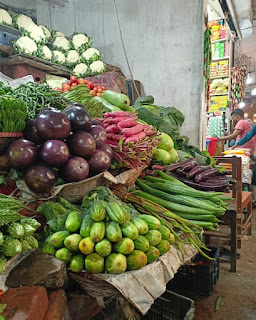,A%20popular%20drink%20in%20Bangladesh%20.jpg) |
| Milk Tea: A popular beverage in Bangladesh |
I
wrote this piece on a snowy late afternoon while sipping a hot cup of coffee.
Outside my window, I can see how the streets were blanketed in an enchanting
layer of white snowflakes. The snow fall reminds me of those rainy days back
home in Bangladesh where people often enjoy the melody of rain by sharing
stories, munching on warm, crispy pakoras (fritters made with vegetables, gram
flour, spices, and herbs). The taste of good food, the sound of rain, spending
time with loved ones create moments of sitting back, with joy, and contentment.
It is always memorable to observe Adda.
“Adda”
is a Bangla term used to refer a casual get-together with acquaintances. Adda
is one of the most popular social gatherings to unwind and unite with loved
ones. They are often organized at someone's home, where friends and family
gather to catch up and chat over a steaming cup of cha (tea) and snacks.
The snacks served can include samosas (a triangular-shaped deep-fried,
crispy pastry filled with spiced potatoes, peas, meat, or other vegetables), or
Jhal Muri (puffed rice, mixed with different spices, herbs, diced onion,
tomato, chili peppers, lime zest). Cha is a popular beverage, and its
consumption is woven into the frame of everyday life. Furthermore, it is an expression
of hospitality and warmth. There are two popular forms of Cha in the Bengali
culture: milk tea and masala tea. Milk tea is made with black tea leaves, sugar,
and milk. On the other hand, Masala tea (spiced tea) is a more flavorful
version of tea that is made with a blend of spices and herbs. The common spices
used in masala tea include ginger, cloves, cardamom, and cinnamon.
Nowadays,
having quick and lonely meal- time has become the norm due to my hectic
schedule and limited social connections. I long for the sound of laughter,
banter, and warmth of our family kitchen, where the aroma of my mother's
cooking would fill the air. Bengali cuisine reflects the harmonious balance of
flavors, and diversity inherent in the culture of Bangladesh. One of the key
elements that make it so unique and flavorful is the use of a variety of
spices, such as chilies, garlic, cumin, turmeric, ginger, coriander, mustard
seeds, bay leaves and cardamom. Additionally, geographical location, history,
and climate greatly influence Bengali cuisine.
The
factors listed above affected the type and way our vegetables are prepared. A
variety of vegetables (leafy greens, potatoes, squash, radish, carrots, okra,
cucumber, eggplant, cauliflower, cabbage, etc.) hold a prominent place in
Bengali meals and are used to create different nutritious and flavorful dishes.
From curries to stir-fries, vegetable dishes are a hearty way to incorporate
fresh ingredients into a meal. The fresh vegetable markets offer consumers a
variety of options for purchasing locally grown vegetables that are in season. In
addition to vegetable markets, vegetable carts are also popular which offer a
convenient way for consumers to buy fresh produce on the go. These mobile
vendors travel through neighborhoods, sell a variety of fresh vegetables to customers
who may not have the time to travel to a marketplace.
 |
| Vegetable Market: Dhaka City |
Food
is deeply connected to my feelings and memories of Bengali culture. The process
of organizing and cooking traditional dishes is also a way to express love and
care for others. For instance, certain dishes may be associated with a specific
person, and time and can take you back to a feeling of nostalgia. Sometimes,
grandparents pass down recipes and cooking procedures to their grandchildren. Cooking
certain dishes builds bridges among multiple generations. These meals are a way
of celebrating our ancestors, who lived before us. The significant aspect of
food is not limited to nourishing but is deeply rooted in traditions and
emotions. Food serves as a symbol of unity, celebration, hospitality, generosity,
and expression of cultural identity.
Mahbuba Airin | Graduate Student, CDE | ECVOntario
SEDRD | University of Guelph.

.jpeg)